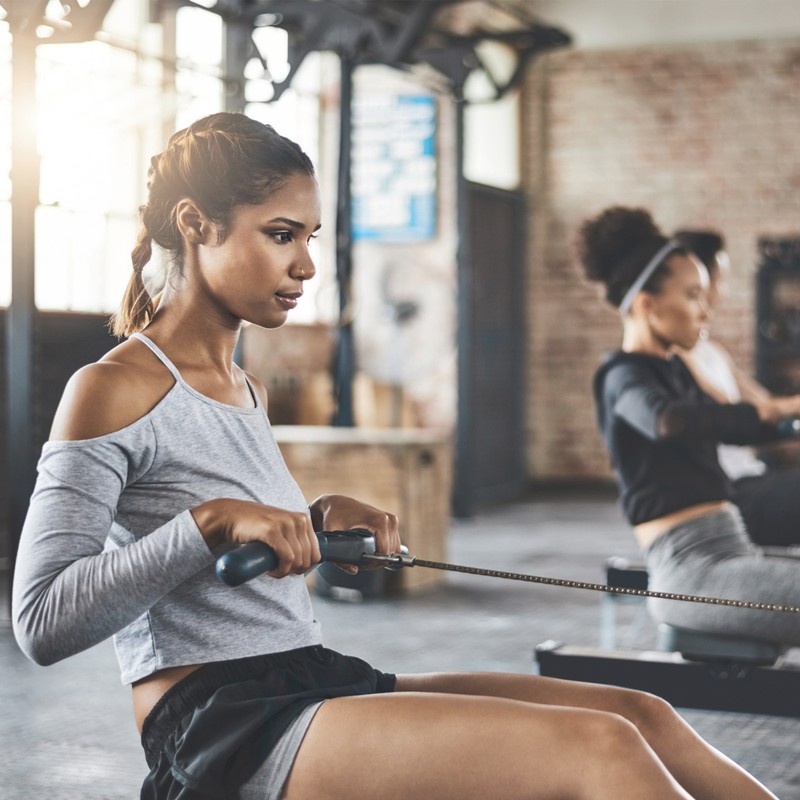Is Rowing The New Spinning?
It Burns Major Calories
There’s a reason why you sweat so much on the rower – while Niko has a strict rule that you should never count calories (“It’s just important that you move.”), he does reveal that while an hour–long spin class can burn around 500 – 600 calories, rowing can burn 700 – 1000, depending on your intensity.
It’s An All–Over Workout
This is the key allure of rowing over spinning: Niko advises that muscle group engagement and quality of movement in the act of rowing are what makes it a far superior workout than spinning.
He explains the main difference between the two: “Spinning is an almost hunched–over seated position. The arms can be locked or bent, so you’re getting a little bit of chest [engagement] and a lot of triceps. You’re not getting a lot of posterior chain development [the primary muscles in the backside of your body] because of this closed hip position.
“You are cycling with the legs, so you get quad, hamstring and calf development, but they are never fully extended. There is some core engagement to hold a stable position but generally, there is little challenge. Don’t believe me? Pull up a picture of any Tour de France competitor: massive legs, tiny upper body. There’s a distinct lack of balance.”
Although rowing is also performed in a seated position, Niko explains that the way you’re sat involves an entirely different motion, which works far more of your muscle groups at a different capacity: “Each rep mimics a leg press, a deadlift, and a seated row. One stroke uses around 85% of your muscles across nine major muscle groups. One stroke requires you to work your calves, quads, hamstrings, glutes, abs, obliques, pecs, biceps, triceps, deltoids, upper back, and lats. It hits almost every muscle and that’s a massive benefit over spinning.
“Then there’s the movement quality. When done correctly, you are fully flexing and extending your legs and hips. At the same time, you’re demanding that your core stabilises against an aggressive forward pulling force. Then simultaneously, you’re pulling with your rhomboids, lats and biceps. That’s discounting the forward motion which then switches from quads to hamstrings and from back to chest. It’s a phenomenal functional motion.”
It’s Aerobic, Anaerobic And Weight–Lifting All In One
If you save your HIIT workout for one day and your powerlifting for another, then give rowing a try – it’s a strong combination of both of these things and more. “The pulling and pushing make this resistance training, but because it’s also being done at a steady pace you’re getting cardiovascular training too,” Niko explains. “If you then speed it up, it becomes HIIT, or anaerobic (without oxygen as the fuel). Anaerobic exercise is exercise intense enough to cause lactic acid to form, used by athletes in non–endurance sports to promote strength, speed and power and by body builders to build muscle mass.”
It Encourages Good Posture
Whereas spinning is performed in a hunched over position, for those with back issues, rowing is a great exercise to stretch and strengthen the back muscles. “If you have a good trainer, they correct your position,” says Niko. “These movements encourage resistance against the hunched position, so when you’re stood upright, your strong back muscles pull your shoulders back and make you more upright.”
It’s Empowering
When you’re working every muscle during rowing, you can really feel it. It’s hard work, and that’s what makes rowing such an empowering exercise. As Niko says: “It’s measurable, technical, and develops endurance and strength.”
Visit Equilibrium for more information.
DISCLAIMER: We endeavour to always credit the correct original source of every image we use. If you think a credit may be incorrect, please contact us at info@sheerluxe.com.






